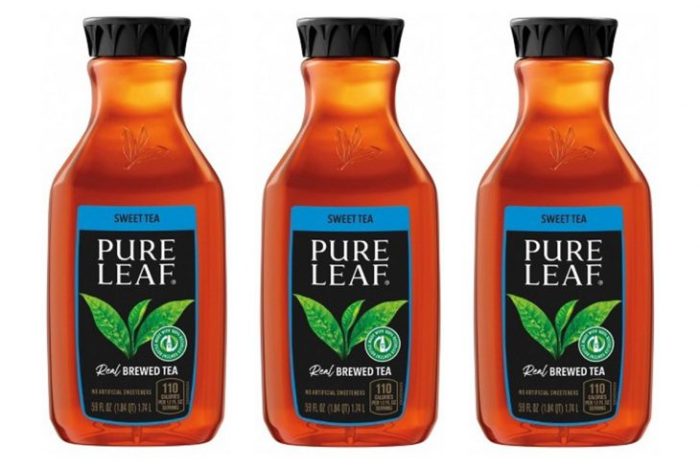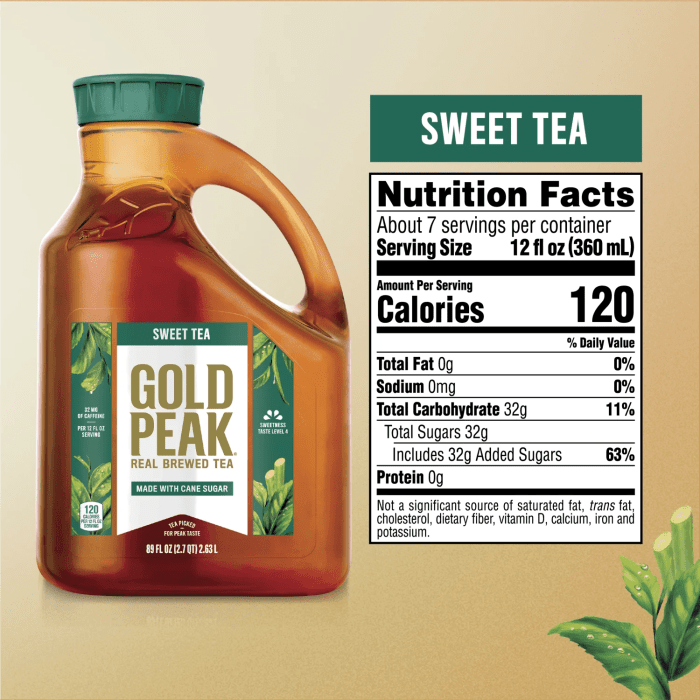Sweet Tea Ingredients and Variations

Sweet tea nutrition facts – Sweet tea, a beloved beverage across the Southern United States and beyond, boasts a surprisingly simple yet endlessly adaptable recipe. Its core components allow for a delightful range of flavors and brewing methods, catering to diverse palates and preferences. Let’s delve into the fascinating world of sweet tea ingredients and their delightful variations.
The foundation of any good sweet tea lies in its two primary ingredients: tea leaves and sugar. While seemingly basic, the choice of tea type, the brewing method, and the type of sweetener significantly impact the final product’s taste and character. Beyond these core components, many variations incorporate additional flavors and ingredients to create unique and exciting sweet tea experiences.
Typical Sweet Tea Ingredients
A standard sweet tea recipe typically consists of black tea leaves, water, and granulated sugar. However, variations abound. For instance, some prefer using tea bags for convenience, while others opt for loose leaf tea for a richer, more nuanced flavor. The water used should ideally be filtered or spring water to avoid any off-flavors that might interfere with the delicate taste of the tea.
Right, so sweet tea, innit? Loads of sugar, proper bad for your teeth. If you’re looking for something a bit healthier, maybe check out the body armor nutrition facts – they’ve got electrolytes and stuff. But still, sweet tea’s a bit more peng, even if it’s not exactly the healthiest bevvy going.
The type of sugar can also be altered; some might use brown sugar for a deeper, more molasses-like sweetness, while others might opt for honey or other liquid sweeteners. The ratio of tea to water and sugar to tea is adjusted to personal preference.
Types of Sweet Tea
Sweet tea comes in various forms, each with its own unique preparation method and resulting characteristics. The most common types are brewed sweet tea, instant sweet tea, and flavored sweet tea.
| Type of Sweet Tea | Preparation | Characteristics | Example Brands (Illustrative, not exhaustive) |
|---|---|---|---|
| Brewed Sweet Tea | Steeping tea leaves in hot water, followed by adding sugar and cooling. | Rich, robust flavor; can be customized to individual preferences. | Many regional brands; often homemade. |
| Instant Sweet Tea | Dissolving pre-mixed sweet tea powder in cold water. | Convenient, but often less intense flavor than brewed tea. | Various brands available in grocery stores. |
| Flavored Sweet Tea | Adding flavorings like lemon, peach, or other fruits to brewed or instant sweet tea. | Adds complexity and depth of flavor; wide variety of options available. | Many commercial brands offer various fruit-flavored options. |
Ingredient Proportions in a Standard Recipe
While personal preferences dictate the exact ratios, a common guideline for a standard brewed sweet tea recipe is presented below. Remember, these are merely suggestions; feel free to experiment and find your perfect blend!
| Ingredient | Approximate Proportion | Notes |
|---|---|---|
| Water | 8 cups (1.9 liters) | Use filtered or spring water for best results. |
| Black Tea Bags | 4-6 tea bags | Adjust based on desired strength; loose leaf tea can be substituted. |
| Granulated Sugar | 1-1.5 cups (200-300g) | Adjust to taste; other sweeteners can be used. |
Sweet Tea and Health Implications

Sweet tea, a beloved beverage across many cultures, offers a refreshing respite on a hot day. However, understanding its potential health implications is crucial for enjoying it responsibly. While a moderate consumption might not pose significant health risks for some, regular indulgence in heavily sweetened versions can lead to several health concerns. This section explores the potential benefits and drawbacks of sweet tea consumption, offering insights into making healthier choices.Sweet tea’s primary health concern stems from its high sugar content.
The typical glass packs a significant sugar punch, far exceeding recommended daily limits for many individuals. This excess sugar intake contributes to various health problems, directly impacting weight management and increasing the risk of chronic diseases.
Potential Risks Associated with High Sugar Intake from Sweet Tea
Excessive sugar consumption from sweet tea, like other sugary drinks, is linked to a range of negative health outcomes. The high fructose corn syrup often used as a sweetener is particularly problematic. These risks include weight gain, type 2 diabetes, heart disease, and non-alcoholic fatty liver disease. Studies have consistently shown a correlation between high sugar-sweetened beverage consumption and an increased risk of these conditions.
For example, a study published in the American Journal of Clinical Nutrition demonstrated a significant association between sugar-sweetened beverage intake and the development of type 2 diabetes. The high caloric density of sweet tea, devoid of essential nutrients, contributes to weight gain when consumed regularly in large quantities. This excess weight, in turn, exacerbates the risk of other health problems.
Comparison of Sweet Tea’s Health Implications to Other Sweetened Beverages
Compared to other sweetened beverages like soda or fruit juices, sweet tea often holds a similar, if not higher, sugar content per serving. While some fruit juices offer vitamins and antioxidants, the added sugars in most commercially available versions negate these benefits. Soda, similarly, offers little to no nutritional value and is often loaded with artificial sweeteners and colors.
The key difference lies in the perception: sweet tea might be viewed as a more “natural” or less harmful option than soda, yet its high sugar content poses similar risks. Ultimately, the health implications of all these beverages are largely determined by the sugar content and frequency of consumption.
Tips for Making Healthier Sweet Tea Choices
Making healthier sweet tea choices is entirely possible. The key lies in moderation and mindful ingredient selection.
- Reduce sugar: Use significantly less sugar than usual, or explore natural sweeteners like stevia or honey in moderation.
- Brew it yourself: Homemade sweet tea allows for complete control over sugar and other ingredients.
- Opt for unsweetened varieties: Many cafes and restaurants now offer unsweetened tea options, allowing you to control the sweetness.
- Portion control: Be mindful of serving sizes; a smaller glass is a healthier choice than a large one.
- Choose healthier sweeteners: If you must add sweetener, consider using natural alternatives like stevia or a small amount of honey.
Caloric Content and Serving Sizes
Sweet tea, that delightful Southern staple, offers a refreshing respite on a hot day. However, understanding its caloric content is crucial for maintaining a balanced diet. The number of calories in your sweet tea depends significantly on two key factors: the serving size and the amount of sweetener used. Let’s delve into the details to help you make informed choices.
The caloric content of sweet tea is directly proportional to the amount of sugar added. Unsweetened tea, brewed from tea leaves and water, contains virtually no calories. However, the addition of sugar, honey, or other sweeteners dramatically increases the calorie count. Even seemingly small additions can significantly impact your daily intake, especially if you consume multiple servings throughout the day.
Understanding this relationship allows you to adjust your sweet tea consumption to fit your dietary needs and goals.
Calorie Counts for Different Sweet Tea Types and Serving Sizes
The following table provides a general estimate of calorie counts for various sweet tea options and serving sizes. Remember that these are estimates, and the actual calorie count may vary slightly depending on the specific ingredients and brands used.
| Sweet Tea Type | 8 oz Serving (approx. 240ml) | 16 oz Serving (approx. 470ml) | 24 oz Serving (approx. 710ml) |
|---|---|---|---|
| Unsweetened | ~0 calories | ~0 calories | ~0 calories |
| Sweetened with 2 tbsp Sugar | ~80 calories | ~160 calories | ~240 calories |
| Sweetened with 4 tbsp Sugar | ~160 calories | ~320 calories | ~480 calories |
| Sweetened with Honey (2 tbsp) | ~100 calories | ~200 calories | ~300 calories |
Calculating Daily and Weekly Caloric Intake from Sweet Tea
Calculating your sweet tea calorie intake is straightforward. Simply multiply the calories per serving by the number of servings you consume. For example, if you drink two 16-ounce servings of sweet tea sweetened with 4 tablespoons of sugar daily (320 calories/serving
– 2 servings = 640 calories), your daily intake from sweet tea alone would be 640 calories. To determine your weekly intake, multiply your daily intake by seven (640 calories/day
– 7 days = 4480 calories).
To accurately track your caloric intake from sweet tea, consider using a food diary or a calorie-counting app. These tools can help you monitor your consumption and make adjustments as needed.
Sweet Tea Alternatives and Healthier Options
Let’s explore refreshing and revitalizing alternatives to traditional sweet tea, focusing on healthier choices that still deliver that delightful, thirst-quenching experience. We’ll discover ways to reduce sugar while preserving the flavor you love, and compare the nutritional benefits of different options. Ultimately, the goal is to enjoy a cool, refreshing beverage without compromising your health.
Reducing sugar intake is a key step towards a healthier lifestyle, and sweet tea, with its often high sugar content, is a prime candidate for a makeover. Fortunately, there are numerous delicious and satisfying ways to achieve this. By making smart substitutions and mindful adjustments, you can enjoy the taste of sweet tea without the guilt.
Healthier Sweet Tea Alternatives, Sweet tea nutrition facts
Several refreshing beverages offer similar satisfaction without the hefty sugar load of traditional sweet tea. Unsweetened iced tea, for example, provides the same refreshing qualities without the added sugars. Infused waters, flavored with fruits like berries, cucumber, or mint, offer a naturally sweet and hydrating alternative. Similarly, sparkling water with a squeeze of citrus fruit provides a bubbly and refreshing option.
These alternatives offer hydration and flavor without the excessive calories and sugar.
Reducing Sugar Content in Sweet Tea
The key to reducing sugar in sweet tea while maintaining flavor lies in experimentation and finding the right balance. Start by gradually decreasing the amount of sugar you typically use, perhaps by 25% initially. Then, taste and adjust as needed. Consider using natural sweeteners like stevia or honey in moderation, as these offer a slightly different sweetness profile.
Adding fresh fruit, such as berries or peaches, can also contribute natural sweetness and enhance the flavor complexity. Remember, a little goes a long way.
Nutritional Comparison of Sweet Tea and Alternatives
A typical glass of traditional sweet tea can contain a significant amount of sugar, leading to high calorie intake and potential health concerns. Unsweetened iced tea, on the other hand, is essentially calorie-free and sugar-free, offering hydration without the drawbacks. Infused waters and sparkling water with fruit also provide minimal calories and sugar, making them excellent choices for those watching their sugar intake.
The following table illustrates this comparison:
| Beverage | Calories (approx.) | Sugar (approx.) |
|---|---|---|
| Traditional Sweet Tea (16 oz) | 200-300 | 40-60g |
| Unsweetened Iced Tea (16 oz) | 0-5 | 0g |
| Infused Water (16 oz) | 0-10 | 0-2g (depending on fruit) |
| Sparkling Water with Citrus (16 oz) | 0-10 | 0-2g (depending on citrus) |
Note: Calorie and sugar content can vary depending on the specific recipe and ingredients used.
Flavor Enhancers for Sugar-Free Sweet Tea
Adding flavor to sweet tea without relying on added sugar opens up a world of culinary creativity. Many ingredients can enhance the taste and aroma of your tea, creating a refreshing and flavorful beverage without the sugar rush.
Here are some delightful options:
- Fresh fruit slices (lemon, lime, orange, berries, peaches)
- Fresh herbs (mint, basil, rosemary)
- Spices (cinnamon sticks, cloves, star anise)
- Fruit purees (unsweetened apple sauce, pureed berries)
- Vanilla extract (a few drops)
Top FAQs: Sweet Tea Nutrition Facts
Is sweet tea dehydrating?
While the sugar content might contribute to dehydration in some, the liquid itself does provide hydration. However, excessive sugar intake can outweigh this benefit.
Can I make sweet tea with artificial sweeteners?
Yes, you can use artificial sweeteners like stevia or sucralose to reduce the sugar content. However, be mindful of the potential long-term health effects associated with some artificial sweeteners.
Does sweet tea contain caffeine?
Yes, sweet tea contains caffeine, as it’s made from brewed tea leaves. The caffeine content will vary depending on the type of tea used and the brewing time.
Are there any vitamins or minerals in sweet tea?
Tea itself contains some antioxidants and minerals, but the added sugar often overshadows these benefits. The nutritional value depends heavily on the type of tea and whether it’s unsweetened.



